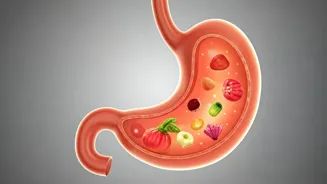Eat Mindfully, Slowly
One of the initial steps to reduce bloating is to change how you eat. The pace at which you consume food directly impacts your digestive processes. The article
suggests mindful eating, which involves paying close attention to what you are eating and how it is affecting your body. Eating slowly enables a thorough chewing process, making it easier for the food to be digested, therefore minimizing the likelihood of developing bloating. Being mindful while eating also helps recognize early signs of fullness, so you do not overeat. Additionally, consider portion control. Eating excessive amounts of food at a time can overload your digestive system, thus inducing bloating. Eating with full attention can help you practice self-regulation, helping in avoiding eating too much.
Watch Your Sodium Intake
Sodium intake is another aspect highlighted to manage bloating. Excessive consumption of sodium leads to water retention in the body, potentially causing bloating. The article emphasizes the importance of closely monitoring sodium consumption, particularly from processed foods, which are usually high in sodium content. Processed foods have high amounts of hidden sodium and should be avoided. The article recommends choosing whole, unprocessed foods where you can control the amount of sodium. Cooking at home allows you to manage salt intake in your meals, preventing excess water retention. Besides, it also suggests that you pay attention to any sauces and seasonings you add to your meals, as these also may contain high amounts of sodium.
Fiber-Rich Diet Choices
Incorporating fiber-rich foods into your diet is another key point to ease bloating. The article suggests that a sufficient intake of dietary fiber aids in better bowel function, reducing bloating. The article emphasizes the significance of both soluble and insoluble fiber. Soluble fiber dissolves in water, forming a gel-like substance that assists in slowing the digestive process and also helps with the absorption of nutrients. Foods high in soluble fiber include oats, apples, and beans. Insoluble fiber, on the other hand, does not dissolve in water and adds bulk to the stool, helping facilitate bowel movements. Examples of insoluble fiber sources include whole grains and vegetables. Gradual increases in fiber intake are also recommended to allow the body to adjust. In addition, the article also says to drink plenty of water to help facilitate the smooth movement of fiber through the digestive system.
Identify Food Sensitivities
Identifying potential food sensitivities or intolerances is essential for reducing bloating. The article suggests that certain foods can trigger digestive distress and bloating. Common culprits include lactose (in dairy products) and gluten (in wheat, barley, and rye). Recognizing and removing these food items may considerably reduce bloating. The article suggests keeping a food diary to track what you are eating and note the symptoms, helping in identifying foods causing bloating. By observing your reactions to specific foods, you may be able to determine if eliminating certain items from your diet will improve your bloating symptoms. It emphasizes the importance of consulting a healthcare professional for guidance on food sensitivity testing, as such tests may provide clear information on which food items to avoid.
Probiotics and Gut Health
The article suggests that supporting gut health with probiotics can also help reduce bloating. Probiotics are beneficial bacteria that support a healthy gut environment. Probiotics can be found in fermented foods such as yogurt, kefir, and kimchi, and by introducing probiotics, you can increase the beneficial bacteria in your digestive system. The balance between good and bad bacteria in the gut plays a role in digestive health, and a healthy gut helps reduce gas and bloating. The article advises choosing probiotic-rich foods and also recommends consulting with a healthcare provider about probiotic supplements to determine the best course of action for your specific needs. Regular intake of probiotics can improve digestion and reduce bloating by encouraging a balanced and functioning gut.
Stay Hydrated Regularly
Adequate hydration is also vital in reducing bloating. The article highlights the importance of drinking adequate water to aid digestion and reduce the chances of gas and bloating. Drinking enough water supports overall gut health, ensures efficient digestion, and prevents constipation, which can cause bloating. Furthermore, water helps to facilitate the movement of food through the digestive tract. The article recommends drinking water throughout the day, particularly between meals, to support digestion. The importance of water intake is also emphasized for managing constipation. Therefore, by staying hydrated, you are not only preventing dehydration but also supporting smooth digestion, which helps reduce the possibilities of developing bloating. Make water your primary beverage for optimal health.
Exercise Regularly
The article also highlights the benefits of regular physical activity for reducing bloating. Exercise stimulates the digestive system and supports consistent bowel movements, thus reducing gas and bloating. Light to moderate exercise, like walking, jogging, or yoga, can boost the process of digestion. Exercise also helps to minimize stress, which in itself can also contribute to bloating. The article recommends integrating regular physical activity into your routine. Even moderate exercise can contribute to improved overall health and reduce bloating. Additionally, the article points out that by exercising frequently, you improve your metabolic rate and overall digestion, which can also reduce bloating. In combination with other lifestyle adjustments and nutritional changes, including regular physical activity helps to support a healthier digestive system.



















